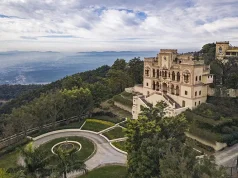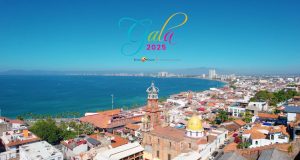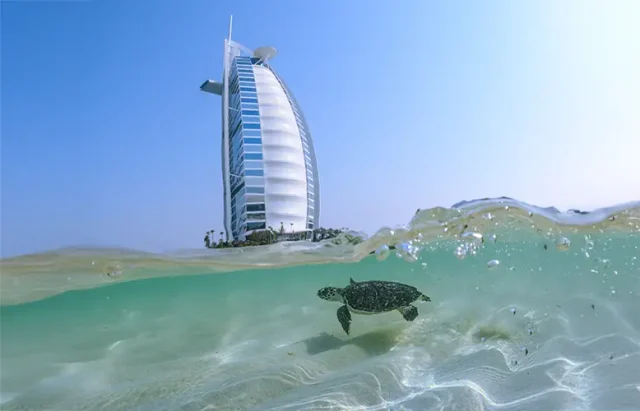
In celebration of World Sea Turtle Day, Jumeirah – together with members of the community, guests and partners – released 72 rehabilitated sea turtles back into their natural habitat this morning. The release included Hawksbill and Green turtles, and marks a significant milestone for the Dubai Turtle Rehabilitation Project (DTRP), with over 2,300 turtles now returned to the wild since its launch in 2004.
Among those released was Najeeb – meaning “noble” and “generous” in Arabic – an 80kg male Green turtle rescued in December 2024 with severe injuries to both front flippers. Najeeb was one of two turtles fitted with a satellite tracker, allowing the DTRP team to monitor his journey after release. The last time the team released a male Green turtle of similar size, it travelled all the way to nesting sites in Oman. Najeeb is one of many turtles nursed back to health by the dedicated team at the DTRP, based at Jumeirah Burj Al Arab and Jumeirah Al Naseem. Each release marks a meaningful step forward in the ongoing mission to protect marine life and preserve biodiversity in the Arabian Gulf.
This year, the DTRP reached a significant conservation milestone with the rare rescue of a Loggerhead baby – a species not known to nest in the Arabian Gulf. The tiny turtle, discovered earlier this year, represents an important finding in marine science for the region. According to experts from the IUCN and regional organisations, there are no previous records of Loggerhead turtles nesting inside the Gulf.
“This was a remarkable moment for our team and a meaningful step forward in our understanding of sea turtles in the Gulf,” commented Barbara Lang-Lenton, Director of Aquarium at Jumeirah Burj Al Arab and DTRP lead. “Sea turtles have remarkably complex biology, and there is still much to uncover about their behaviours, migration patterns, and nesting habits in this region. Each new finding, like this one, helps us piece together a more complete picture of their presence and life cycles in the Gulf, guiding future conservation efforts.
Although the Loggerhead baby was not part of today’s release, it is expected to return to the wild in the coming months. This discovery follows another milestone in 2024, when a Green turtle nest was recorded in Abu Dhabi for the first time, underscoring the growing importance of the region in global marine conservation efforts.
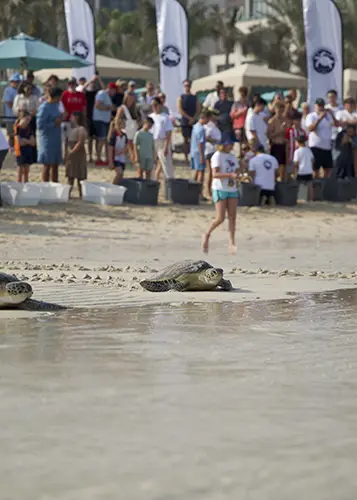
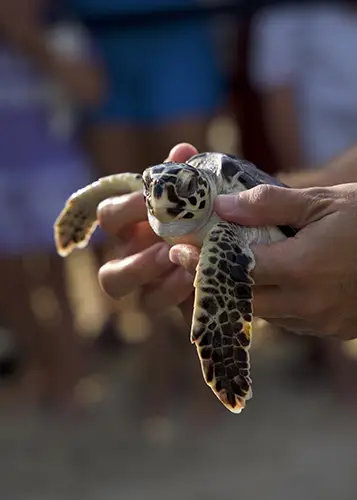
To further celebrate World Sea Turtle Day, a variety of conservation-focused activities took place across Jumeirah’s portfolio. In Abu Dhabi, Jumeirah Saadiyat Island, in partnership with the Environment Agency – Abu Dhabi (EAD), hosted an intimate release of 135 sea turtles on its pristine beachfront. Meanwhile, guests at Jumeirah Bali witnessed the release of newly hatched turtles into their natural habitat, as part of a long-standing collaboration with Eco Tourism Bali. The event also featured an engaging educational programme on sea turtle conservation and the importance of protecting marine biodiversity – fostering greater awareness of ocean health and encouraging responsible travel.
Beyond turtle rehabilitation, Jumeirah has been expanding its marine conservation initiatives through coral restoration efforts – one of several projects under the ‘Planet’ pillar of its sustainability strategy. A new coral nursery at the Turtle Lagoon in Jumeirah Al Naseem is now visible to guests and incorporated into daily educational experiences. In collaboration with ecosystem restoration specialists Ocean Revive, the team is researching and testing new technologies to grow and reintroduce corals into the sea. So far over 1,400 fragments have been created, with over 300 already translocated to the sea.
In addition, Jumeirah continues to support DUBAI REEF – a pioneering purpose-built reef development and one of the largest in the world – which aims to increase marine biodiversity and protect the emirate’s coastal ecosystems. Reflecting Dubai’s commitment to marine conservation, the three-year initiative will see over 20,000 reef modules deployed across 600 square kilometres to restore marine habitats and support the growth of indigenous corals, thereby enhancing marine life. As part of this initiative, Jumeirah is contributing through coral fragmentation work at the turtle lagoon at Jumeirah Al Naseem, where small coral fragments – known as “frags” – are attached to circular discs, often called “coral cookies”, providing a stable base for growth and easy handling. To date, more than 3,000 coral fragments have been created through this process, contributing to the initiative’s broader goal to help repopulate and strengthen local reef systems.
Jumeirah’s commitment to marine preservation extends across its global portfolio, with impactful initiatives at its resorts in Tanzania and the Maldives. At Jumeirah Thanda Island, the team partners with local NGOs Marine Megafauna Foundation (MMF) and Sea Sense to protect whale sharks and endangered turtles and engage local communities through education and conservation training. In the Maldives, guests at Jumeirah Olhahali Island actively contribute to reef restoration to help regenerate the vibrant marine habitats that surround the resort.
These interconnected efforts reflect Jumeirah’s wider sustainability vision, grounded in the principles of people, planet and responsible governance. With every turtle released, coral fragment planted, and guest educated, the brand reaffirms its mission to preserve the marine ecosystems that surround its hotels and resorts.


